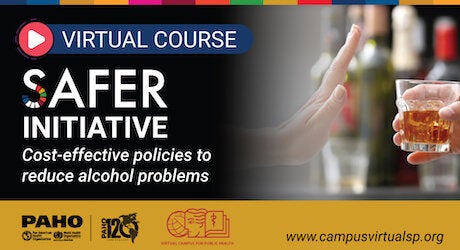
Join us on Tuesday 21 June, from 8:00 to 9:30 AM (EDT) on the webinar to launch the report "No Place for Cheap Alcohol: The potential value of MINIMUM PRICING for protecting lives ". The online event will launch the Alcohol pricing policies: the potential value of minimum pricing for protecting lives report. This report provides a first-ever review and global mapping of minimum pricing policies on alcohol and a summary of the most recent evidence on their impact. It discusses minimum pricing and a specific form – minimum unit pricing (MUP) – in connection with other pricing policies and, most importantly, alcohol taxation.
The webinar is aimed to researchers, policymakers and government officials who will be designing and implementing alcohol-related studies.
How to participate
- DATE: Tuesday, 21 June 2022
- TIME: 8:00 to 9:30 AM [EDT] [check below the local time in other cities]
- REGISTER: https://who.zoom.us/meeting/register/tJYtcuipqjItEtFkC0G7VSfv7JAVro-xXpyy
- LANGUAGE: Interpretation available in English, Spanish and Russian.
Recording
Background
The report covers the following topics:
- Policy mapping: which countries and regions have a minimum price for alcohol?
- The evidence for minimum pricing.
- Common objections to minimum pricing policies.
- Legal issues relating to minimum pricing policies
- Considerations after minimum pricing has been implemented
- Choosing the most appropriate pricing policies
- Conclusions: the value of minimum pricing for protecting lives
Alcohol pricing policies and alcohol taxation are among the most effective and cost–effective measures to reduce alcohol consumption and harms, but they are also the most underutilized. Alcohol taxation is the most widely used pricing policy and all Member States in the European Region have some form of alcohol tax in place, yet these taxes are often implemented in a way that is unlikely to be beneficial to public health. Minimum pricing policies are a relatively new and unexplored tool to reduce affordability of alcohol and thus consumption levels and the global evidence accumulated so far suggest that they are successfully targeting specifically the cheap alcohol and the heavy drinkers who consume it. The report discusses therefore the potential value of minimum pricing policies in reducing health inequalities and the limits as well as potential unintended short-term and long-term consequences of these measures.
This webinar brings together policy and decisionmakers and world leading experts in alcohol pricing and taxation and provides the opportunity for:
- Policymakers to share their experience with the successful implementation of minimum pricing
- The report authors to share key messages from the report and answer any questions related to its content
- Discussion on how the knowledge and experience of policy makers, researchers and WHO can be used to promote effective, population level public health measures to reduce affordability and consumption of alcoholic beverages
Agenda
- 7:45 AM - Registration and participants login
- 8:00 AM - Welcome and opening remarks by WHO
- Carina Ferreira–Borges, Senior Advisor, Noncommunicable Diseases & Programme Manager, Alcohol and Illicit Drugs, WHO Regional Office for Europe
- 8:05 AM - Welcome and opening remarks by the Netherlands
- Delegate from the Netherlands, TBC
- 8:10 AM - Scotland's experience in implementing the minimum unit price on alcohol
- Nicola Sturgeon, First Minister of Scotland (video address)
- 8: 15 AM -WHO report on minimum pricing on alcohol and its potential for protecting lives: overview of key results and take home messages
- Colin Angus, Senior Research Fellow in the Sheffield Alcohol Research Group, Sheffield University, United Kingdom
- 8:25 AM - Minimum prices and taxes on alcohol: what can and what needs to be done to reduce alcohol affordability in our Region? A commentary on the report
- Franco Sassi, Professor of International Health Policy and Economics, Imperial College London, United Kingdom and Member of the WHO/Europe NCD Advisory Council
- 8:35 AM - Building capacity for country impact: what can and what needs to be done to reduce alcohol affordability in our Region? A commentary on the report
- Jürgen Rehm, Senior Scientist, Institute for Mental Health Policy Research & Campbell Family Mental Health Research Institute, Centre for Addiction and Mental Health, Toronto, Canada and Member of the WHO/Europe NCD Advisory Council
- 8:45 AM -Minimum pricing in the Region of the Americas: what are the lessons learned? A commentary on the report
- Maristela Monteiro, Senior Advisor on Alcohol and Substance Abuse, Noncommunicable Diseases and Mental Health Department, Pan American Health Organization
- 8:55 AM - Question and answer session
- Moderator: Eric Carlin, , Consultant, Alcohol and Illicit Drugs Programme, WHO Regional Office for Europed
- 9:25 AM - Closing remarks
- Juan Tello, , Unit Head, Less Alcohol Unit, WHO Headquarters
Time correspondence
- 5:00 am.– Los Angeles, Vancouver
- 6:00 am. – Belmopan, Guatemala City, Managua, San Jose (CR), San Salvador, Tegucigalpa
- 7:00 am. – Bogota, Mexico City, Panamá City, Kingston, Lima, Quito
- 8:00 am. – Asunción, Bridgetown, Caracas, Castries, Georgetown, Havana, La Paz, Nassau, Ottawa, Port-au-Prince, Port of Spain, San Juan, Santiago, Santo Domingo, Washington DC
- 9:00 am – Buenos Aires, Brasilia, Montevideo, Paramaribo
- 2:00 pm. – Geneva, Madrid
For other cities, check the local time in the following link.
Related links
SAFER - WHO´S package to prevent and reduce alcohol-related death and disability
SAFER initiative: cost-effective policies to reduce alcohol problems



